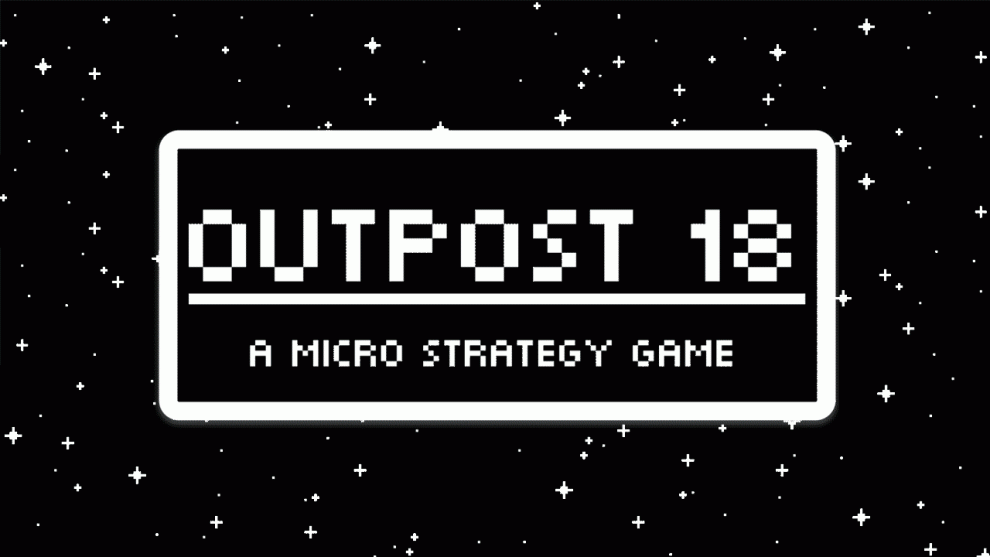Disclosure: Meeple Mountain received a free copy of this product in exchange for an honest, unbiased review. This review is not intended to be an endorsement.
The first thing you think of when someone says “card game” is probably something with the classic deck of 52. The next thing you might think of is the card duel.
Stop me if you’ve heard this one before. Two players face each other, a tableau of cards sprawled out between them. Players take turns drawing and playing cards, using symbols in their tableau to power attacks against each other. It’s a kind of race, with both players trying to be the first one to make the final blow. I’m guessing this sounds familiar.
Freshman game designer Adam Wilk throws a wrench into this formula by asking a couple of interesting questions. What if there was one shared deck…and what if that deck was only 18 cards?
The Value of Small
Outpost 18 comes in a cute little envelope small enough to slip into your pocket. The stylistic choices are immediately apparent: Wilk is invoking a kind of nostalgia-fueled pixel art that reminds me of Boss Monster or The Battle at Kemble’s Cascade. Every card in the deck has a nice pixelated spaceship, each with its own powers and opportunities.

It’s this slim deck of cards that makes up the game. Industry folks will sometimes call this minimalist approach a microgame, a style made popular by games like Love Letter and Circle the Wagons.
These design choices have definite benefits, chief of which to me is that the bar to entry is lowered. Outpost 18 follows the tried-and-true formula of rule-bending cards with unique powers. In a deck full of powerful abilities, it can sometimes be hard to keep track of how things interact. Cutting down on the card count leaves more room for interesting and powerful effects, since players can become familiar with the whole deck within a couple short rounds.
How it Works
Each player starts the game with a single card in front of them: their Station Core. This Core is the most important card in the game. To win Outpost 18, one player must attack their opponent’s Station Core. But how exactly do they do that?
On your turn, you basically have three steps:
- Play a card.
- [Optional] Attack using cards you played on previous turns.
- Draw a card.
It’s a pretty simple formula. What makes Outpost 18 interesting is the way cards are placed and used. You can play the card as either a ship, or an upgrade.

Ships are what you use to attack your opponent – they all have some amount of attack power, and some unique ability that triggers when you attack with them. Note that playing a ship is not the same thing as attacking with it! Ships can’t attack until at least one turn after they’re played, and there’s no limit on how many of your ships you can attack with in this way. Your opponent’s Station Core has five health, which means you have to have a sum of at least five power across the ships you’re choosing to attack with in a single turn to win.
Here’s the big catch in Outpost 18: when you use a ship to attack, it gets destroyed in the process. One player might use this mechanism to try and save up an arsenal of ships to launch that final blow. Another might spend their ships chipping away at opposing defences, which are called upgrades.
Upgrades are the second way to play cards. Each card has a thin strip of icons and health along the bottom, visible when tucked underneath the Station Core.

Upgrades serve two functions in Outpost 18: first, they act as a kind of ongoing resource generator. Many ships have bonus attack powers which only activate when a certain resource threshold is met. To make the best use of your attacking ships, you’ll need a good collection of upgrades powering them from behind the front lines.
Upgrades also act as a defense system. Some upgrades, marked with an exclamation mark, have to be attacked and destroyed before an opponent is able to attack your Station Core. Not that your other upgrades are safe — any upgrade can be targeted by an opponent attacking with their ships, and an upgrade that’s destroyed is stolen by your opponent.
Together, this means that the game is in constant flux. Ships attack and explode, leaving an empty battlefield. Upgrades are destroyed and captured, whittling defences down even as they’re built up. The playing field changes dynamically, and big moments tend to come in waves.
Working Out the Kinks
Like any Kickstarter, Outpost 18 is still a product in development. There are a few powers that aren’t perfectly clear, and a couple icons that don’t exist (but would help the game if they did). I’m confident these quirks will be worked out. Why?
I’ll lift the veil for a second here to say that reviewers often have conversations with the designers. We don’t just review games — we also talk about rule ambiguities, design errors, and anything else that would be helpful to know before the game is released. Adam Wilk — Outpost 18’s designer — is self-publishing the game. In emails, in person, and on BoardGameGeek, Wilk has been forward and receptive to the little design tweaks that will help clarify some of the subtler rules. I’m pretty confident that the final set of cards will be clear from the first play. In its current form, Outpost 18 plays fast and fun… but there’s a few things that are only obvious on the rematch. Fortunately, the game rarely lasts more than ten minutes — so I’ve had good, engaging experiences even with the current iconography.
Outpost 18 is currently on Kickstarter, with only a few days left. If you like the sound of a small game with some big punches, I recommend checking it out for yourself.











Add Comment